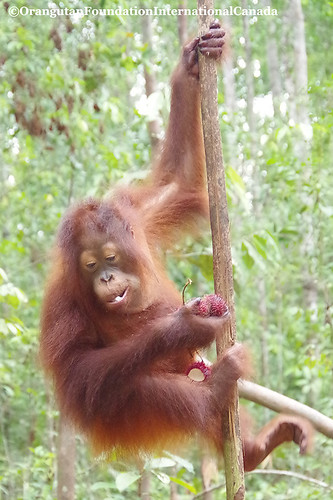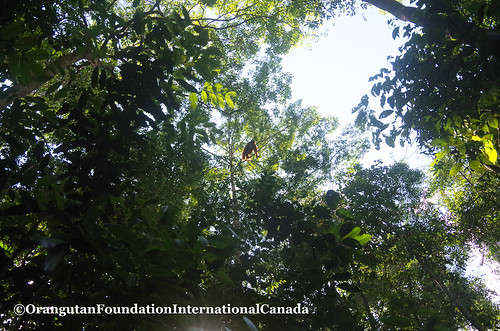We celebrate Orangutan Awareness Week to appreciate the orangutans, learn about this amazing species, and remind ourselves and each other why they need our help and protection more than ever.
 Captivated by stories of palm oil deforestation, orphans, tragic statistics and triumphant rescues, it can sometimes be easy to forget the quiet and deep connections between the orangutans and the forests they still inhabit.
Captivated by stories of palm oil deforestation, orphans, tragic statistics and triumphant rescues, it can sometimes be easy to forget the quiet and deep connections between the orangutans and the forests they still inhabit.
One of these connections has everything to do with the orangutans’ arboreal (tree-dwelling) and frugivorous (fruit-eating) nature. In the Camp Leakey study area within Tanjung Putting National park, Dr. Biruté Mary Galdikas and her associates have recorded over 200 species of wild fruit eaten by local orangutans. The fruits range from the rich and succulent karantungan (wild durian), covered in vicious spikes, to the small and seedy kariwaya (tropical fig). Because the rainforest trees fruit asynchronously (not at the same time), orangutans are always on the move, eating and searching in an endless cycle. It is in this ancient orangutan rhythm – swinging, stopping, picking, climbing, peeling, eating, swinging – that they play out one of their essential roles.
Tropical fruit seeds are typically large. Too heavy to be dispersed by the breeze, they overwhelmingly rely on animals to move the next generation of the rainforest around. Orangutans, with their enormous appetite and large home ranges, perform a priceless service as they disperse the seed of their varied diet, either in their feces, in their hands, or on their fur. Rainforests typically regenerate through ‘gap dynamics’ – a single old giant topples, pulling down or crushing its neighbours, and essential sunlight briefly penetrates the jungle gloom and reaches the forest floor. It is in these brief windows of opportunities that new seedlings must quickly sprout and begin the race for the rainforest canopy. For that to happen, seeds must already be present on the forest floor, awaiting their chance. The seeds dropped by the oragutans passing over head in the previous months and year serve this purpose

This week, and year-round, when you think of Southeast Asia’a orangutans or choose to support our work in conserving them, take an extra moment to thank these orange stewards of the jungle for their important work on maintaining the global treasure that is our rainforests.


